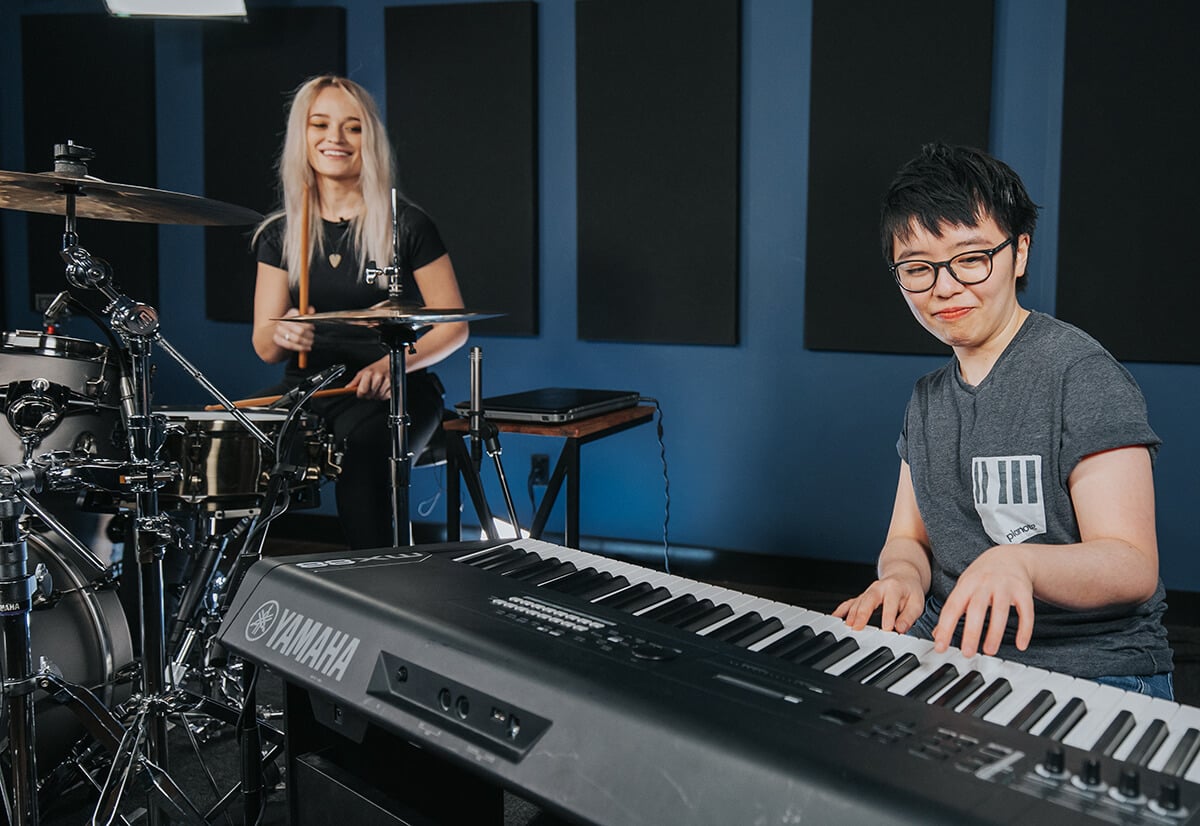
Learning another instrument will make you a better drummer, expand your musical horizons and improve your ears.
Listening is the most important element of playing with other people, and knowing how to play piano, bass or guitar could open your mind to new musical possibilities you didn’t even know existed!
It can also help you avoid “drum noodling” or playing extra notes that don’t serve the song. Despite years of bad jokes, drummers are musicians too and need to consider elements like melody and harmony when we play, just like everyone else.
Here are some of the key reasons why you should learn to play another instrument:
You’ll be able to understand and communicate better with your bandmates. What if someone says “let’s take it from the A minor chord”? If you have a little piano or guitar knowledge, you’ll know exactly where to come in. Just hearing the difference between a major and a minor chord is such a valuable tool (bet you didn’t know those childhood piano lessons were going to be so important to your drumming)!
All musicians, including drummers, should know how to play piano since it includes the major musical elements of rhythm, melody, and harmony.
It’s also great for drummers to be able to sing (check out Josh Dion for tips and tricks). Learning to communicate melodies by singing will make it so much easier to refer to different parts of a song so you aren’t struggling to get on the same page. You don’t have to be Pavarotti – just good enough to get your point across!
Every bit of information you can gather about a tune can be useful when you’re playing it for the first time. Chord changes, melodies, vocal cues and bass lines can serve as markers to help you keep your place.
For example, if the chord progression is different when you get to the bridge of a song, identifying that sound can let you know if you’re in the right (or wrong) spot. You don’t have to know exactly which chords they’re playing or what key they’re in, just that the tone color of the music has changed. You can use this knowledge to adjust what you’re playing accordingly, like switching to the ride, changing the dynamics, or altering your part.
Every instrumentalist feels the beat in different ways, and learning to play bass is especially useful for drummers since the groove relationship between those instruments is the foundation of the rhythm section. Hearing how bass lines are constructed can make it easier to lock in your bass drum pattern and play tighter grooves.
As a beginner, learning to play bass is also not as harmonically challenging as picking up another instrument since you’ll be playing mostly single notes rather than chords.
You’ll learn to play melodically around the kit instead of shredding a bunch of rudiments that aren’t related to the song. The best soloists on any instrument take a simple idea and expand upon it, which is a classical music concept called “motivic development.”
One of the best techniques for playing an interesting solo on drums is to sing the melody of the tune in your head while you’re playing. This will help make your solo a part of the song and give it context. Guitar players, horn players, and even vocalists do this too.
Each instrument has different frequencies and it’s useful to know how your drums fit in so everyone isn’t making noise in the same tonal space. For example, the bass drum has a low frequency similar to the bass guitar, so it might be good to avoid playing it too much during a bass solo. Your cymbals are higher-pitched and can sit in the same “tone zone” as the vocals and guitars, so you don’t want to overwhelm quiet parts of the song with those frequencies.
This is an advanced-level concept, but it’s great for beginners and intermediate players to think about it since it’ll make you a much better drummer (and make your bandmates happy).
The more skills you have, the more opportunities you’ll get to work with other people. What if you audition for a band and they’re deciding between two great drummers: one who sings and one who doesn’t? That singing ability could tip the scales in your favor.
Artists like Phil Collins and Dave Grohl have had amazing careers as drummers who have stepped out front to sing, but just being able to do backup parts and lock in on harmonies is a valuable skill.
Many drummers today are also incorporating loops, keyboards, and other electronics into their kits. While you don’t have to become a ‘one-man band’, knowing how to play piano can really open up some cool new possibilities for expanding your setup.
Sometimes you might feel like playing music but you’re stuck in a rut with your drum practice. Grabbing a bass or guitar can help you release that musical energy and even stoke your creative juices the next time you hop behind the kit. You can also use the guitar or piano to write songs and come up with musical ideas to take into your band practices or jam sessions.
The bottom line is that it’s important for drummers to be well-rounded musicians with a working knowledge of all aspects of the music they’re playing. Everything you play on the drums is affected by what the other instruments are doing, and the more you know, the better you’ll play. So grab another instrument and start rocking out!
Edited by Sam Landa, Content Marketing Manager at Drumeo
Drumeo Team - We're professional, award-winning drummers and drum teachers, coaches, recording artists, and content specialists who are passionate about drums and helping drummers around the world. This post was written and/or edited by Sam Landa, Brandon Toews, Jared Falk, Dave Atkinson, or another pro on our team (which has a combined 1000+ years of drumming experience). Are you looking for inspiration, education, and support to take your playing to the next level? Join the Drumeo community today!


By signing up you’ll also receive our ongoing free lessons and special offers. Don’t worry, we value your privacy and you can unsubscribe at any time.
We use cookies for traffic data and advertising. Cookie Policy »